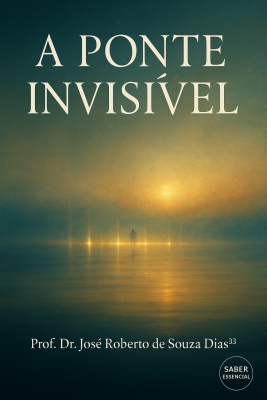Vivemos um tempo em que os extremos se tornaram mais visíveis do que as ideias. De um lado, os que falam em liberdade; de outro, os que clamam por igualdade. Ambos dizem querer o bem, mas já não se escutam. Entre eles há um abismo, não de pedra, mas de linguagem. E é nesse silêncio confuso que um velho carpinteiro decide construir uma ponte.
Não é uma ponte de cimento, mas de sentido. Ele quer apenas devolver às pessoas a possibilidade de compreender o que dizem e de sentir o que pensam. Começa recolhendo as tábuas esquecidas da sabedoria antiga: respeito, mérito, verdade, limite e liberdade. Cada uma tem o tamanho exato de um gesto humano. Pregando-as com pregos de paciência, o velho percebe que o segredo não está em ensinar o difícil, mas em torná-lo simples.
As pessoas zombam. Dizem que uma ponte invisível não serve para nada. Mas o velho carpinteiro sabe que o invisível é o que sustenta o real. A cada martelada, ouve dentro de si uma voz suave: “Explica o difícil como se falasses a uma criança, e verás o quanto aprendeste.”
Com o tempo, a ponte começa a ser percebida. O primeiro a atravessar é um rapaz cansado das certezas. Para no meio e diz: aqui posso escutar. Depois vem uma mulher que perdera a fé nas instituições e murmura: liberdade sem virtude é só capricho. Outros seguem, e a ponte vai se tornando um caminho natural, uma passagem entre o ruído dos extremos.
Não é liberal, nem conservadora. É humana. Uma estrada de razão e ternura, feita para transformar conceitos em experiências e pensamentos em compreensão. Quando perguntam ao carpinteiro qual é o segredo daquela obra que ninguém vê e todos sentem, ele responde com serenidade: não construí uma ponte, apenas lembrei às pessoas que pensar é um ato de amor.
Chamaram de Ponte Invisível a pequena obra do velho. Com o tempo, seus passos viraram escola. Ali, os que desejavam falar sobre o mundo aprendiam primeiro a ouvi-lo. Porque o verdadeiro renascimento das ideias, sejam conservadoras, liberais ou espirituais, começa quando alguém tem coragem de dizer o essencial com palavras simples
The Invisible Bridge
We live in a time when extremes have become more visible than ideas.
On one side are those who speak of freedom; on the other, those who cry out for equality.
Both claim to seek the good, yet they no longer listen to each other.
Between them lies an abyss — not of stone, but of language.
And in that confused silence, an old carpenter decides to build a bridge.
It is not a bridge of cement, but of meaning.
He only wishes to give people back the ability to understand what they say and to feel what they think.
He begins by gathering the forgotten planks of ancient wisdom: respect, merit, truth, restraint, and freedom.
Each has the exact size of a human gesture.
As he nails them together with patience, the old man realizes that the secret is not in teaching what is difficult, but in making it simple.
People mock him.
They say an invisible bridge is useless.
But the old carpenter knows that what is invisible is what sustains what is real.
With every strike of the hammer, he hears within himself a gentle voice:
“Explain the difficult as if you were speaking to a child, and you will see how much you have learned.”
In time, the bridge begins to be noticed.
The first to cross it is a young man weary of certainties.
He stops halfway and says: Here, I can listen.
Then comes a woman who had lost faith in institutions; she murmurs: Freedom without virtue is only whim.
Others follow, and the bridge becomes a natural path — a passage between the noise of extremes.
It is neither liberal nor conservative.
It is human.
A road of reason and tenderness, made to turn concepts into experiences and thoughts into understanding.
When they ask the carpenter about the secret of that work which no one can see but everyone can feel, he answers with serenity:
I did not build a bridge. I only reminded people that thinking is an act of love.
They called the old man’s humble work The Invisible Bridge.
In time, his steps became a school.
There, those who wished to speak about the world first learned how to listen to it.
For the true rebirth of ideas, whether conservative, liberal, or spiritual, begins when someone dares to say the essential in simple words.


